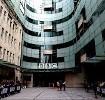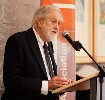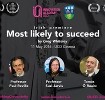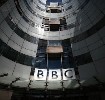David Puttnam: Brexit would impoverish film, TV and creative industries
‘As Ireland’s Digital Champion, I have seen at first-hand the importance of the digital single market’
For a number of years now I’ve been one of over 250,000 British people who call Ireland their home. But I remain a British citizen and, despite being a member of the House of Lords, on this occasion I’ll be able to vote Remain in the forthcoming referendum on the UK’s continuing membership of the European Union.
I feel very passionately on this subject, and believe it is critical the UK remains in the EU. I’ll go further; I find it deeply disturbing that a departure should even be contemplated.
Of my fellow countrymen based here in Ireland, it’s estimated that 120,000 of us are entitled to cast vote in the referendum, and I sincerely hope every one of them registers by close of business on May 16th – the deadline to do so.
I’d also appeal to those many Irish in Britain who, because of the historical relationship between our two islands, have the right to make their vote count in the referendum. I know that Irish people are very supportive of Ireland’s membership of the EU.
An opinion poll carried out by Red C for European Movement Ireland in 2015 showed that 84 per cent of people living in Ireland believe membership of the EU has benefited the country. Spending a portion of every week in both places, I know for sure that what’s good for Ireland is also good for Britain.
Business and other leaders, who have voiced concerns in public, have focused on the implications of a Brexit on our shared border and our Common Travel Area, both of which are very important. Other dimensions of our lives will also be affected though, should the UK do the unthinkable and leave the union.
Interlinked destiny
The destiny of our two islands has been interlinked and, while borne from a complex and difficult history, the relationship is a thriving one in the fields of arts, culture, business, education and technology.
From the perspective of the world I know best, the film, TV and creative industries, life outside of the EU would be massively impoverished, both culturally and financially. Membership of the EU has supported and enhanced the peace process for the greater good of both islands.
Structural funds and the single market have led to growth and economic prosperity separately, as well as between our two economies.
The protection of women’s rights through a large body of EU legislation prohibiting discrimination – on equal pay and equal rights for women in the workplace, including maternity leave – were also vital to improving equality.
As Ireland’s Digital Champion, I have also seen at first-hand the importance of the digital single market and the significant opportunities it brings for both islands to work together in helping people and organisations to develop skills which are increasingly essential to our living and working together in the 21st century.
Finally, I would like to turn to the global issues which face us. Among these, the impacts of climate change and the growing refugee crisis are particularly pressing, but there are others such as the co-existing demographic challenges of ageing and youth unemployment.
Collaborative solutions
I’d argue that never before in human history have we experienced a set of multifaceted problems which, by their very nature, require us to collaborate and share responsibility for urgent but sustainable solutions. It is the worst imaginable moment for a great nation like the United Kingdom to make a once-in-a-generation decision to become isolated and insular.
As well as voting Remain next month, I’m taking part in the European Movement Ireland’s #PhoneAFriend campaign. I feel compelled to act. I can only hope that the 5.5 million Irish diaspora in the UK, including the 500,000 Irish-born citizens living in Britain, will exercise their right to vote by registering online by June 7th.
I urge you to think long and hard about the colossal choice facing all of us.
This vote affects far more people than those 64 million living in the UK; it will dramatically impact our children, along with those future generations for whom we carry a huge responsibility.
Source: The Irish Times










